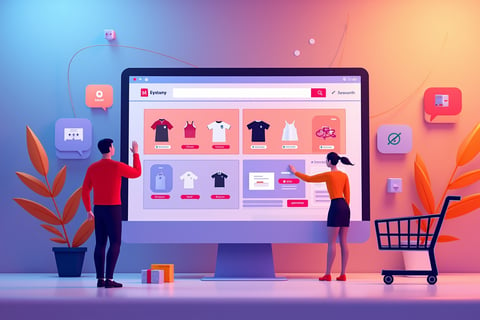Best Ecommerce Platform In India
Get in-depth analysis for all E-commerce platforms available in India
7 min read
Best E-commerce Platform in India


Introduction
India's e-commerce industry has witnessed explosive growth in recent years, fueled by increased internet penetration, affordable smartphones, and a rising preference for online shopping. Whether you're a small business owner, an aspiring entrepreneur, or a large enterprise, choosing the right e-commerce platform is crucial for your success. This guide will help you navigate through the best e-commerce platforms in India and make an informed decision that aligns with your business goals.
Why Choosing the Right E-commerce Platform Matters
Your e-commerce platform is the backbone of your online business. A well-chosen platform can:
1) Boost sales by offering a seamless shopping experience
2) Simplify management of products, orders, and payments
3) Support scalability as your business grows
A poor choice, on the other hand, can lead to technical challenges, customer dissatisfaction, and lost revenue.
Key Factors to Consider When Choosing an E-commerce Platform:
User-friendliness:
A user-friendly platform should have an intuitive interface and a simple setup process, even for beginners. Features like drag-and-drop builders, easy navigation, and step-by-step guides make the platform accessible to users with little to no technical experience. The easier it is to use, the quicker you can launch your store and focus on selling.


Customization options:
A flexible platform allows you to personalize your online store according to your brand identity. This can include custom themes, design templates, plugin integrations, and advanced coding capabilities for developers. The ability to tailor your store's appearance and functionality ensures that your brand stands out.
Payment gateway integration:
In India, offering multiple payment options is essential. Look for platforms that support popular Indian payment gateways such as UPI, Paytm, Google Pay, PhonePe, net banking, and credit/debit cards. A seamless payment experience reduces cart abandonment and boosts customer satisfaction.
SEO and marketing tools: An effective e-commerce platform should come with built-in SEO tools like meta tags, custom URLs, and image alt texts to help your site rank higher on search engines. Additionally, integrated marketing features such as email marketing, discount codes, social media integration, and analytics help drive traffic and increase conversions.


Mobile responsiveness: With a large percentage of Indian consumers shopping via smartphones, your platform must offer mobile-friendly themes and responsive design. A mobile-optimized store ensures that your website looks and functions well on all devices, improving the user experience and boosting sales.
Pricing and scalability: Start with a platform that fits your budget but also has the flexibility to grow with your business. Evaluate the platform’s pricing structure—monthly fees, transaction fees, and additional costs for plugins or features. A scalable platform allows you to upgrade features as your business expands without the need for a complete migration.
Customer support:
Reliable customer service is crucial for troubleshooting technical issues and resolving queries. Look for platforms that offer 24/7 support through live chat, email, or phone. Access to a helpful knowledge base, tutorials, and community forums can also enhance your support experience.


Top E-commerce Platforms in India (In-Depth Review)
1) Shopify
Overview:
Shopify is a globally renowned platform known for its ease of use and powerful features, making it a favorite among entrepreneurs worldwide.
Key Features:
Drag-and-drop website builder
Extensive app store for added functionality
Built-in payment gateway and third-party payment support
Multi-channel integration (Instagram, Facebook, Amazon)
Pricing Plans:
Basic Shopify: ₹1,994/month
Shopify: ₹7,447/month
Advanced Shopify: ₹30,164/month
Pros: User-friendly, great for beginners, excellent customer support, mobile-friendly templates
Cons: Transaction fees unless using Shopify Payments, limited free themes
Popular Use Cases: Dropshipping, small-to-medium businesses, fashion, and lifestyle brands


2) WooCommerce
Overview: WooCommerce is an open-source WordPress plugin that turns any WordPress website into a fully functional online store.
Key Features:
Full customization through plugins and themes
Seamless integration with WordPress
Supports multiple payment gateways
Advanced SEO capabilities
Pricing:
1. Initial Setup Costs:
Domain Name: ₹500–₹1,500 per year.
Hosting: ₹2,000–₹5,000 per year for shared hosting; ₹10,000–₹30,000 per year for VPS or dedicated hosting.
2. Themes and Design:
Premium Themes: ₹4,000–₹15,000 (one-time cost).
3. Plugins and Extensions:
Essential Plugins: ₹5,000–₹30,000 annually, depending on functionality.
4. Development and Customization:
Freelance Developers: ₹500–₹2,000 per hour.
Development Agencies: ₹20,000–₹1,00,000 for comprehensive projects.
5. Maintenance and Support:
Monthly Packages: ₹2,000–₹10,000.
Premium Support: ₹5,000–₹15,000 per year.
6. Marketing and SEO:
SEO Plugins: ₹2,000–₹5,000 per year.
Marketing Tools: ₹5,000–₹50,000 per month, based on scale and objectives.
Pros: High flexibility, strong SEO, cost-effective for WordPress users
Cons: Requires WordPress knowledge; hosting and security setup needed separately
Popular Use Cases: Bloggers expanding into e-commerce, niche market sellers, digital product sales
3)Magento (Adobe Commerce)
Overview: Magento is a powerful, open-source e-commerce platform designed for scalability and customization, ideal for larger businesses.
Key Features:
Highly customizable with robust tools
Supports multiple languages and currencies
Built-in advanced SEO features
Scalable for large inventories and traffic
Pricing:
1. Initial Setup Costs:
Domain Name: ₹500–₹1,500 per year.
Hosting: ₹24,000–₹72,000 per year, depending on server specifications.
2. Licensing:
Magento Open Source: Free.
Adobe Commerce: Starts at $22,000 (approximately ₹16,50,000) per year, with pricing based on Gross Merchandise Value (GMV).
3. Themes and Design:
Pre-designed themes: ₹5,000–₹20,000.
Custom Themes: ₹50,000–₹2,00,000, based on complexity.
4. Extensions and Development:
Extensions: ₹4,000–₹40,000 per extension annually.
Development:
Freelancers: ₹1,000–₹3,500 per hour.
Agencies: ₹2,50,000 and above for full project development.
5. Maintenance and Support:
Monthly Maintenance: ₹8,000–₹40,000, depending on service level.
6. Additional Costs:
SSL Certificate: ₹4,000–₹24,000 per year.
Payment Gateway Integration: ₹8,000–₹80,000, based on complexity.
Total Estimated Annual Cost for Magento Open Source: ₹1,56,000–₹12,25,200, excluding licensing fees.
Pros: Full control over customization, strong security features
Cons: Requires technical expertise, costly setup and maintenance
Popular Use Cases: Large enterprises, multinational e-commerce businesses


4) BigCommerce
Overview: BigCommerce is a versatile e-commerce platform known for its scalability and built-in features.
Key Features:
Multi-channel selling (eBay, Amazon, social media)
Built-in SEO and marketing tools
No transaction fees
Comprehensive analytics dashboard
Pricing:
1. Standard Plan
Cost: $29 per month (approximately ₹2,438) when billed annually.
Features:
Unlimited products, storage, and bandwidth
No transaction fees
24/7 live phone and chat support
Up to $50,000 (approximately ₹4 million) in online sales per year
Up to 3 storefronts
2. Plus Plan
Cost: $79 per month (approximately ₹6,640) when billed annually.
Features:
All Standard Plan features
Abandoned cart recovery
Advanced customer segmentation
Stored credit cards
Up to $180,000 (approximately ₹14.4 million) in online sales per year
Up to 5 storefronts
3. Pro Plan
Cost: $299 per month (approximately ₹25,140) when billed annually.
Features:
All Plus Plan features
Google customer reviews integration
Advanced product filtering
Custom SSL
Up to $400,000 (approximately ₹32 million) in online sales per year
Up to 8 storefronts
4. Enterprise Plan
Cost: Custom pricing based on specific business requirements.
Features:
All Pro Plan features
Unlimited API calls
Priority support
Custom facets and price lists
No set limit on online sales
Ideal for large enterprises with complex needsPros: Scalable, rich in built-in features, secure and reliable
Cons: Higher pricing, limited free themes
Popular Use Cases: Growing brands, B2B and B2C businesses
5) Dukaan
Overview: Dukaan is an easy-to-use platform for local sellers and small businesses looking for quick online store setup.
Key Features:
Simple mobile app-based store creation
WhatsApp integration for order management
Custom domain support
Pricing:
1. Free Plan
Service Fee: 4.99% per order
Maximum Fee per Order: ₹200
Payment Gateway Charges: As applicable
Features:
Basic online store setup
Unlimited products
Order management
Access to marketing tools
Free SSL certificate
Abandoned cart recovery
Discount codes
Themes and plugins
24/7 support
5 staff accounts
2. Starter Plan
Cost: ₹6,000 per year
Service Fee: 3.99% per order
Maximum Fee per Order: ₹200
Payment Gateway Charges: As applicable
Additional Features:
Custom domain support
Inventory management
Integration with popular payment gateways
Access to premium themes
Store analytics
COD RTO optimizer
Store APK file
3. Growth Plan
Cost: ₹37,500 per year
Service Fee: 1.99% per order
Maximum Fee per Order: ₹200
Payment Gateway Charges: As applicable
Additional Features:
All Starter Plan features
Multi-language support
Abandoned cart recovery
Access to premium themes
Store analytics
COD RTO optimizer
Store APK file
4. Infinity Plan
Cost: ₹99,900 per year
Service Fee: 0.99% per order
Maximum Fee per Order: ₹200
Payment Gateway Charges: As applicable
Additional Features:
All Growth Plan features
Store AAB file for Play Store
Free whitelabeled WhatsApp subscription
Free abandoned cart automation messages
Dedicated account advisor
Support for 10 multi-warehouses
Pros: Affordable, quick setup, mobile-friendly
Cons: Limited advanced features and customization
Popular Use Cases: Small retailers, local shops, home-based businesses


How to Choose the Right Platform for Your Business
Identify your business goals: Are you focusing on growth, local sales, or niche markets?
Budget considerations: Factor in setup costs, subscription fees, and commissions
Technical expertise: Platforms like WooCommerce and Magento require more technical know-how
Growth potential: Choose a platform that scales with your business needs
FAQs
What is the best e-commerce platform for small businesses in India?
Shopify and Instamojo are great options for small businesses.
Can I switch platforms later if my business grows?
Yes, though migrating data can be complex and might require professional help.
Are there free e-commerce platforms available in India?
WooCommerce and Instamojo offer free plans, though advanced features may require payment.
Which platform offers the best customer support?
Shopify is known for its excellent 24/7 customer support.
How important is mobile optimization for Indian e-commerce platforms?
Extremely important, as a significant portion of Indian consumers shop via smartphones.
